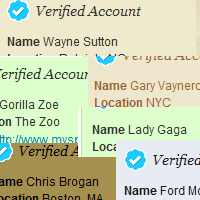Don’t Ban People From Your Forums, They Can Just Come Back
I co-host the Copyright 2.0 Show every Wednesday with Jonathan Bailey and we talk a lot about how you enforce copyright on the web, to ensure that creator or owner rights are respected.
What happens, in many of these cases, is that people are taken offline or removed from a certain situation, but they return to commit the same offenses under a different name.
One of the more recent stories that triggered this type of situation was the U.S. Immigration and Customs Enforcement (ICE) domain seizures where one of the websites that used a domain name that was seized came back online by changing to a new domain name.
Read More









 On Twitter, you have what is called a
On Twitter, you have what is called a 